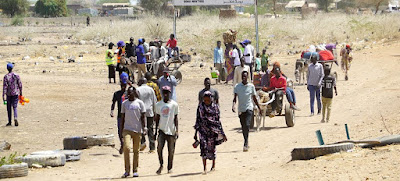Multiple explosions have rocked the Sudanese city of Port Sudan for a third day as paramilitary rebels target government forces.
The Red Sea city has become a refuge for hundreds of thousands of people fleeing the civil war.
The two-year conflict between the army and the paramilitary Rapid Support Forces has already created the world’s worst humanitarian crisis.
The attacks on the port have led to power cuts and represent a new front in the fighting as it had not been targeted before this month.
YouTube link: https://youtu.be/cQHh0HqRmVA
Channel 4 is a British public broadcast service
Source: https://www.channel4.com/news/sudan-war-latest-who-was-behind-port-sudan-attacks
__________________________
Related
Report from BBC
Dated Tuesday, 06 May 2025 - excerpt:
Sudan paramilitary attacks leave key city without power
Drone strikes have hit a major power station in the Sudanese city of Port Sudan causing a "complete power outage", the country's electricity provider said. Flights have been cancelled after drones hit the international airport and a hotel near the current presidential palace, reports say.
Full story: https://www.bbc.co.uk/news/articles/cx20x8g2nego
__________
Report from ReliefWeb
By UN Office for the Coordination of Humanitarian Affairs (OCHA)
Dated Tuesday, 06 May 2025 - full copy:
Port Sudan drone attacks: A call to protect civilian infrastructure - Statement by the United Nations Resident and Humanitarian Coordinator in Sudan, Clementine Nkweta-Salami
(Port Sudan, 6 May 2025) I am shocked and deeply concerned by intensifying drone attacks on civilian infrastructure in Port Sudan, the main humanitarian hub within Sudan. In the early morning hours of 6 May 2025, drone attacks reportedly the Port Sudan International Airport and other infrastructure – including a fuel storage facility and a power transformer – in Port Sudan.
Such attacks will deepen humanitarian suffering and needs, as well as exacerbate the already severe access and logistical challenges that humanitarian actors face in the delivery of urgently needed aid to the rest of the country.
The Port Sudan International Airport is a lifeline for humanitarian operations, serving as the primary entry point for aid personnel, medical supplies, and other life-saving relief into Sudan. Moreover, the availability of fuel in Port Sudan is critical to the dispatch of humanitarian supplies to areas across Sudan in dire need of assistance. Damage to critical infrastructure could also disrupt supply chains and increase the price of basic goods, further exacerbating human suffering in what is already the world’s largest humanitarian crisis.
These latest strikes follow a series of drone attacks over the past days on civilian infrastructure in Port Sudan and Kassala, cities that have largely represented safe locations for civilians who have been displaced multiple times throughout this devastating conflict. Recent attacks on the Kassala Airport in eastern Sudan has forced displaced individuals – who had sought refuge in a gathering site near the airport – to move once again.
Since January 2025, attacks on infrastructure such as power stations, water sub-stations, and oil refineries across the country have caused widespread electricity outages and disrupted access to essential rights and services, including safe drinking water for civilians, healthcare and food supplies.
These attacks are serious violations of international humanitarian law, which prohibits the targeting of civilians and civilian infrastructure. They reflect a consistent failure to comply with the principles of distinction, proportionality and precaution.
Every measure must be taken to spare civilians and civilian objects.
Once again, I call on all those involved in this conflict to cease hostilities.
__________
Report from IOM-DTM
Dated Tuesday, 06 May 2025 - excerpt:
DTM Sudan Flash Alert: Port Sudan (Port Sudan town), Red Sea
Between 5 and 6 May 2025, DTM field teams reported that approximately 120 households were displaced from Transit and Al Shahinat neighbourhoods in Port Sudan town of Port Sudan locality, Red Sea due to increased insecurity following air drone attacks. Households were displaced primarily to locations within Port Sudan locality, Red Sea.
View original: https://mailchi.mp/iom/dtm-sudan-flash-alert-port-sudan-port-sudan-town-red-sea-update-001
__________
Report from BBC News
By Will Ross, Africa regional editor
and Natasha Booty, BBC News - excerpt:
At least seven people have been killed after a hospital and market were bombed in South Sudan, a medical charity has said, as fears grow of a return to civil war.
Doctors Without Borders (MSF) said helicopter gunships dropped a bomb on the pharmacy of the hospital it runs in Old Fangak, Jonglei state, burning it down, before firing on the town for 30 minutes. A drone then bombed a local market, MSF said.
The hospital is the only one in Fangak county, which has a population of more than 110,000 people, MSF said, and all its medical supplies were destroyed.
The charity called the attack, which left 20 people injured, a "clear violation of international humanitarian law".
MSF spokesman Mamman Mustapha told the BBC's Newshour programme the charity was still trying to establish the facts, but local witnesses had said the aircraft were "government forces helicopters".
"The hospital is clearly marked as 'hospital' with our logo," he said. "We have shared also our coordinates for all the warring parties in the area so the hospital should be known to both parties as a hospital."
Full story: https://www.bbc.co.uk/news/articles/cm2536m9r2eo
______________

.jpeg)



.jpeg)
